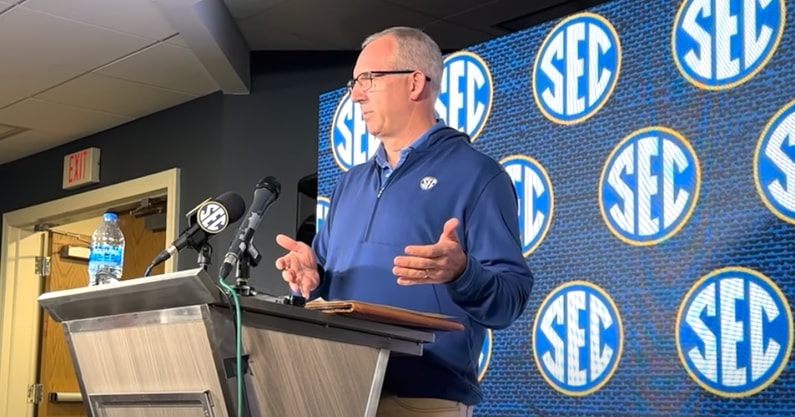Greg Sankey on the future of collectives: 'I don't know that my opinion on that matters right now'

Greg Sankey had a neutral take on collectives in the world of NIL amid the House settlement with the NCAA.
By 2025, schools can pay athletes directly and it’ll be a landmark change across college athletics. But Sankey brushed aside any worry, concern or questions of collectives roles in the future.
Basically, trust the process.
“We’ll see,” Sankey said. “I don’t know that my opinion on that matters right now. We’ll go through this settlement process to its conclusion. Then, again, there’s gonna be a set of decisions made. So we’ll see.”
As far as Sankey’s confidence to see the revenue sharing actually going into effect in 2025? Well, that’s out of his hands. Just like collectives.
“What is my confidence level,” Sankey said. “Let’s go back to earlier to explain what’s going to happen is we have a settlement agreement that goes through a court process. And if the outcome of that process is the settlement is accepted in place and it’s accepted at this time next year, then we will have a model. But that’s not something that I control.”
Greg Sankey mum on future of collectives
Following the settlement, a statement was released last week.
“The five autonomy conferences and the NCAA agreeing to settlement terms is an important step in the continuing reform of college sports that will provide benefits to student-athletes and provide clarity in college athletics across all divisions for years to come,” the Power 5 commissioners and NCAA president Charlie Baker said in a joint statement.
Top 10
- 1Hot
Strip Club Violation
NCAA hammers current Raiders HC Antonio Pierce
- 2New
New gig for Connor Stalions
Connor Stalions in talks with Barstool to become employee
- 3Trending
Shedeur Sanders, Cam Newton moment
Colorado QB addresses awkward meeting
- 4
DJ Uiagalelei
Could FSU QB have a 6th season of eligibility?
- 5
Chez Mellusi steps away
Wisconsin RB taking indefinite absence
“This settlement is also a road map for college sports leaders and Congress to ensure this uniquely American institution can continue to provide unmatched opportunity for millions of students. All of Division I made today’s progress possible, and we all have work to do to implement the terms of the agreement as the legal process continues.
“We look forward to working with our various student-athlete leadership groups to write the next chapter of college sports.”
Terms of the settlement will still need to be presented to Judge Claudia Wilken. House v. NCAA is playing out in California Northern District Court. What could be a months-long process, Wilken will have the power to approve or deny the settlement. Sources have indicated to On3 that Wilken may not support a framework prohibiting athletes from entering future lawsuits.
Of the $2.77 billion expected to be paid in back damages to former athletes, the NCAA is expected to be responsible for 40% of the payout. The other 60% will come from a reduction in school distributions.